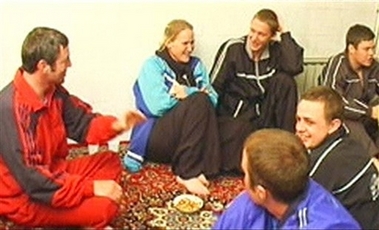Blair calls for direct talks with Iran
(AP)Updated: 2007-04-04 07:23 LONDON - Britain called for direct talks with Iran over 15 captive Britons Tuesday after speaking for the first time with the chief Iranian negotiator. The announcement followed the sudden release of an Iranian diplomat in Iraq that raised new hope in resolving the standoff.
In a statement late Tuesday, Prime Minister Blair's Downing Street office said "both sides share a desire for an early resolution to this issue through direct talks."
Hours after Foreign Secretary Margaret cautioned against expecting a swift resolution to the crisis, Downing Street struck an upbeat note, announcing there had been "further contacts" between the two countries, including with chief negotiator Ali Larijani.
| ||||
Earlier, Iranian diplomat Jalal Sharafi arrived in Tehran, hours after he was freed by his captors in Iraq, officials said. He was seized Feb. 4 by uniformed gunmen in Karradah, a Shiite-controlled district of Baghdad.
His release also suggests the standoff over the captive Britons may end with a de facto prisoner swap ¡ª something both Tehran and London have publicly discounted.
Iran alleged the diplomat had been abducted by an Iraqi military unit commanded by U.S. forces ¡ª a charge repeated by several Iraqi Shiite lawmakers. U.S. authorities denied any role in his disappearance.
In Baghdad, an Iraqi Foreign Ministry official said the Iraqi government had exerted pressure on those holding Sharafi to release him ¡ª but he would not identify who had held Sharafi.
But another senior government official said Iraqi intelligence had been holding him. Both officials spoke on condition of anonymity because they were not supposed to release the information.
Sharafi was a second secretary at the Iranian Embassy involved in plans to open a branch of the Iranian national bank. U.S. officials allege that Iran provides money and weapons to Iraqi Shiite militias.
Sharafi was abducted a month after the U.S. military arrested five other Iranians in northern Iraq. The U.S. described one of those captives as a senior officer of the Quds Force, an elite unit of Iran's Revolutionary Guards.
The Iraqi Foreign Ministry official said his government also was working "intensively" for the release of the five other Iranians to "help in the release of the British sailors and marines."
Neither Iran nor Iraq nor Britain has said explicitly that a prisoner swap was in the works. Iran has denied it seized the Britons to force the release of Iranians held in Iraq, and Britain has steadfastly insisted it would not negotiate for the sailors' freedom.
In Washington, President Bush signaled the same. "I also strongly support the prime minister's declaration that there should be no quid pro quos when it comes to the hostages," Bush said.
It was unclear whether the Iraqis had won Sharafi's freedom on their own initiative to encourage a settlement, which would ease tension without endangering their own claim to the waters where it occurred.
Nevertheless, the release of Sharafi and efforts to free the five other Iranians suggested that the parameters of a deal might be taking shape.
Iran maintains the British sailors had encroached on Iranian territory when they were seized by naval units of the Revolutionary Guards on March 23. Britain insists its sailors and marines were in Iraqi waters and has demanded their unconditional release.
Blair said earlier in the day that the next 48 hours would be "fairly critical" to resolving the standoff over the British personnel, who have been held by Iran since March 23.
Larijani's suggestion Monday of talks over territorial disputes in the Persian Gulf had offered the hope of an end to the crisis, the British premier acknowledged. But if negotiations to win the quick release of the 15 sailors and marines stalled, Britain would "take an increasingly tougher position," Blair said.
Larijani said Monday that Iran sought "to solve the problem through proper diplomatic channels" and proposed having a delegation determine whether British forces had strayed into Iranian territory in the Gulf. He did not say what sort of delegation he had in mind.
Larijani told Britain's Channel 4 news Monday through an interpreter that Iranian officials believed there was no need for any trial of the navy crew.
|
||
|
||
|
|

